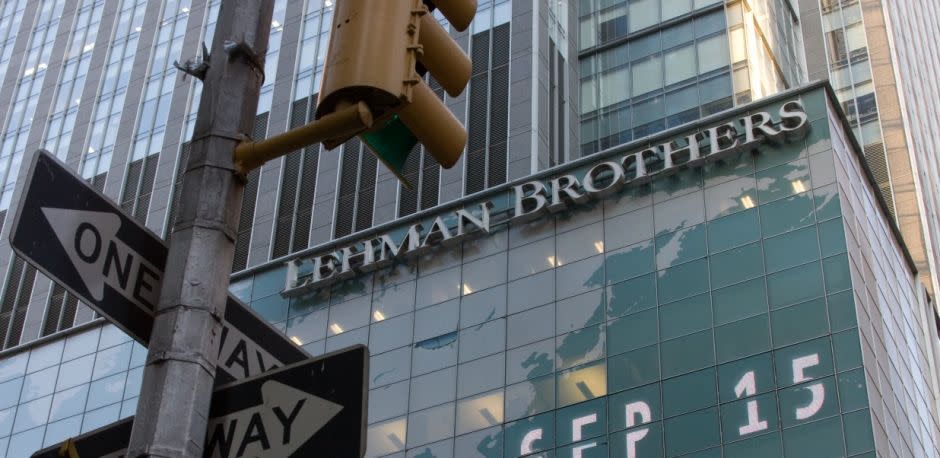When Lehman Brothers collapsed on 15 September 2008, the initial stock market reaction to one of the largest banks on Wall Street going bust wasn’t that big. The FTSE All-Share finished that week down less than 2%. After all, Lehman’s collapse wasn’t the cause of the financial crisis – it was already well underway.
But people soon realised the scale of the problem. When other banks started to look like they could face the same fate, worries hit new heights.
The following two months would go on to include seven of the 10 worst days on the UK stock market over the last 20 years.
I was on the HL stockbroking desk throughout the financial crisis. I saw and heard firsthand the impact falling stock markets had on clients and their investments. And as global markets continued to fall, media speculation went wild.
There were predictions of the end of capitalism, a new great depression and, even the end of stock markets as we knew them. None of that happened.
If you’d missed the 10 best days in the market since Lehman’s collapse, you’d have cost yourself 121% in lost returns.
The big lesson to take away from Lehman’s collapse isn’t that markets can fall suddenly and dramatically. They can and inevitably will at some point again. But with the luxury of hindsight, we can use the financial crisis as a reminder of some of the investing basics.
We’ve quoted performance and income figures to help explain the story, but they’re not a guide to future returns. The value of any investment and any income it pays can rise and fall in value, so you could get back less than you put in.
This article isn’t personal advice. If you’re not sure if investing is right for you, ask for financial advice.
The importance of cash
Cash is one of the most important parts of your financial resilience.
Everyone should have a bit set aside. A rainy-day-pot is essential for covering emergencies. People often refer to covering the cost of a broken boiler or fixing the car. But it’s more important during economic events when jobs are at risk.
When markets are falling, you don’t want to be a forced seller. Having a cash buffer can help support you if the worst happens, for example losing your job.
And, if you’re in a solid financial position, that cash lets you take advantage of stock market falls or new opportunities.
Bad timing can be ok – if you’ve got time
Clearly 12 September 2008, the Friday before Lehman went bust, would’ve felt like a poor time to invest in the UK stock market. In just six weeks the value of the FTSE All-Share Index would fall just over 30%.
But investors should have a long-term horizon. Nobody knows whether the stock market will be higher or lower tomorrow, let alone in days following a financial implosion.
That’s why we say people should typically invest for at least five years.
And the longer you invest for, the better your chances of outperforming cash. Historically, if you’d invested in the stock market for 10 years, you would’ve outperformed cash 91% of the time.
In fact, £10,000 invested in a large FTSE All-Share tracking fund on the 12 September 2008 would be worth £14,772 at close on 8 September 2023, ignoring investment charges.
FTSE All-share performance
6 months | 1 year | 5 years | 10 years | At close 8 September 2023 | |
|---|---|---|---|---|---|
FTSE All-share following 12 September 2008 | -31.11% | -6.35% | 27.23% | 46.47% | 47.72% |
Power of dividends
The figures above don’t take into account the power of reinvesting dividends or charges.
Reinvesting dividends, rather than taking the income, means growth can multiply, and you’ll earn more. That compounding effect is like a snowball that can turbo charge your returns.
The best thing is, you don’t really need to do anything to benefit from it once you start.
Using the same example from above, by reinvesting dividends the value of your holding would now be worth £25,368. Although again this doesn’t include charges, which will impact returns.
Chart showing Capital Returns against Dividends Invested
Don’t try and time your investing
It can be easy to fiddle with your investments. To make short-term reactive decisions.
But, as hard as it might feel, it’s usually best to ignore the noise and focus on your long-term goals. Learn more about the dangers of following the crowd.
If you’d missed the 10 best days in the market since Lehman’s collapse, you’d have cost yourself 121% in lost returns.
So, missing 10 out of 3,608 working days would’ve more than halved your return.
Instead of growing to £25,368, a £10,000 investment grew to just over £13,266 (both including dividend reinvested and excluding charges).
The important thing to remember is that you can’t predict when the best days will happen.
Diversification
Lehman proved there’s no such thing as too big to fail. And when it happens, it often catches investors by surprise.
When you invest in a single company, your investment depends on the fate of that company. If it fails, you risk losing your whole investment.
Thankfully it’s quite rare for companies on the stock market to go bust. But companies can and do struggle and there are no guarantees. Diversification, by holding a wide range of unrelated investments, can help.
